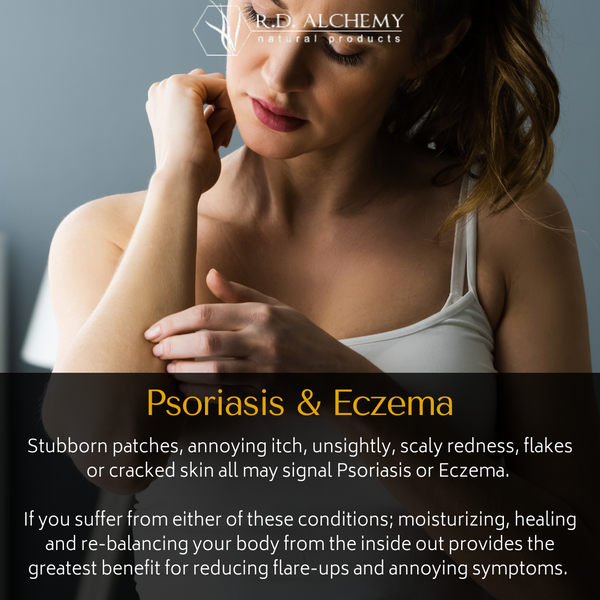How to Treat Sensitive Skin, Psoriasis, Rosacea and Eczema Naturally

Is your sensitive screaming? Have you been experiencing dry, itchy skin with inflammation, redness, rashes or even scales? Severe red patches and silvery scales may need a medical diagnosis, but if you have delicate or sensitive skin then the weather, external pollutants, allergies or even stress may be to blame.
Taking care of your skin naturally requires only a bit of understanding how the skin and the body works. And although the skin is our outer layer, skin care starts within and therefore shouldn't be overlooked.
Common signs of sensitive skin, psoriasis, rosacea and eczema include:
- A patchy rash that varies widely in appearance and color from person to person.
- Small scaling spots (commonly seen in children).
- Dry, cracked skin that may bleed.
- Itching, burning or soreness.
- Redness, inflammation and flakiness.
- Cyclic rashes that flare for a few weeks or months and then subside.
If you are suffering from severe dry skin, sensitive skin, rosacea, eczema or psoriasis, the good news is that these, as well as many other skin conditions, can be treated with a few lifestyle adjustments and switching to less toxic, and more natural skin care products. Check out these skin care tips to help treat and manage symptoms of these annoying and aggravating skin conditions.
TIP #1: GET MOISTURIZED - Moisturize to cure itchy skin.
Conditions like eczema and psoriasis can weaken your skin's barrier function leading to reduced moisture retention or cause an increase in cellular turnover leading to excessive moisture loss, dryness and over time, inflammation and itchiness. Moisturizing often and maintaining moisture in the skin is an important part of treating these conditions.
Pay attention to the products you are using. Are they adding water based moisture to your skin? Are they locking moisture in? Make sure you are using a nurturing and natural moisturizer that allows the skin to absorb water-based hydration, then apply a thicker, richer, buttery cream to lock moisture in. Our Repair Body Care Set is ideal for this job.
TIP #2: KEEP IT COOL - Heat is bad for sensitive skin, psoriasis or eczema.
Hot weather, saunas, hot showers, facial steamers and more can sometimes aggravate and irritate sensitive skin or other conditions causing them to flare-up or worsen. Heat also causes dehydration in the skin which contributes to moisture loss, which violates Tip #1.
Try to keep your skin on the cool side by applying a cold compress, taking lukewarm rather than hot showers, and wearing light colored clothing when it is hot outside. If you enjoy soaking in the tub, add some oats to a warm (not hot) bath to soothe your skin.
TIP #3: BE KIND TO YOUR SKIN - Avoid toxic or harsh ingredients.
When sensitive skin, psoriasis or eczema strikes, it may signal an issue with your body's ability to process certain internal and external substances which can lead to irritation and inflammation. Therefore, certain ingredients or a concentrated build up of these substances overtime within our skin or body can trigger flare-ups or reactions similar to a food allergy.
Since our skin absorbs substances into the body, and reacts to everything we put on it; be gentle to your skin by using soaps, deodorants, lotions, perfumes or other substances that are less toxic and made with more natural or gentler ingredients. Choose natural, fragrance free, sulfate and paraben free products, and ones made with organic ingredients to reduce skin sensitivity.
TIP #4: DITCH THE STRESS - Stress is a major cause of skin irritation or flare-ups.
Immune systems of those with sensitive skin or autoimmune conditions are usually operating in an hypervigilant state. Internal and external stress can wreak further havoc on these fragile systems causing imbalances to occur leading to flare-ups or skin worsening conditions.
Exercise, meditation and journal writing are excellent outlets to help defuse that turbulent energy we call stress. You can read more about the direct and indirect connection between stress and skin health HERE.
TIP #5: NOURISH FROM WITHIN - Herbs good for sensitive skin, psoriasis or eczema.
Since psoriasis and eczema isn't just limited to our skin, but more importantly typically begins from within, it's important to eat right and take supplements when needed. Herbs that help cleanse and balance the digestive and lymphatic systems such as Burdock, Dandelion and Cleavers are helpful when allergies or gut imbalances are an issue. If stress is a major culprit, adaptogenic and relaxing herbs such as Passionflower, Ashwaganda and Kava can be beneficial.
Give your sensitive skin a boost with our Skin Health Extract, a natural supplement to cleanse, nourish and rejuvenate problematic skin to help clear, smooth and soften it for a healthy glow.

Healthy, beautiful skin begins from within and contributes significantly to sensitive skin, psoriasis, rosacea and eczema as does what you use on the outside. You can improve your skin’s health and reduce issues with the right lifestyle changes and switching to cleaner, healthier products. These five simple tips will get you on your way to healthier, nourished skin for the long term.
Want more in depth information to different skin care ingredients and how to use them? Check out our new e-book / paperback available on Amazon.com: Your Best Skin Yet: Popular Natural Ingredients In Skincare and How to Use them: A quick guide to common and natural ingredients to formulate skincare at home or in a professional setting.

Sources:
Mayo Clinic: Psoriasis
WebMD: Home Remedies for Psoriasis
RD Alchemy: Stress & Skin Health

